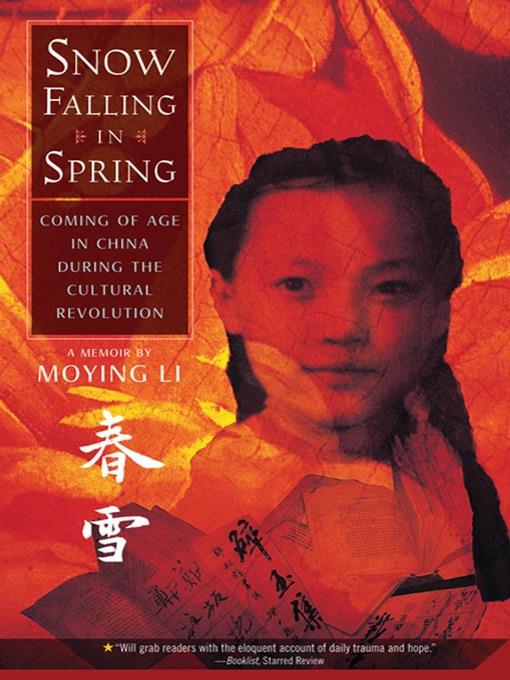
Snow Falling in Spring
Coming of Age in China During the Cultural Revolution
فرمت کتاب
ebook
تاریخ انتشار
2010
Lexile Score
1020
Reading Level
6-8
ATOS
7.1
Interest Level
6-12(MG+)
نویسنده
Moying Liشابک
9781429940788
کتاب های مرتبط
- اطلاعات
- نقد و بررسی
- دیدگاه کاربران
نقد و بررسی

ciarasmagnet - so good!

Starred review from February 25, 2008
Recalling 2007's Revolution Is Not a Dinner Party
, a fictionalized autobiography by Ying Chang Compestine, this memoir also offers a highly personal look at China's Cultural Revolution. The author is four years old when Mao initiates the Great Leap Forward in 1958, and she describes the transformation of the family's shared, once lovely courtyard as the neighbors follow orders to erect a brick furnace and feed it all their metals in an attempt to produce iron and steel. Everyone, including the child narrator, willingly cooperates, but the instructions are flawed and everything is ruined. The episode prefigures what follows: diligence is repaid with destruction, obedience with chaos, loyalty with treachery. Li effectively builds the climate of fear that accompanies the rise of the Red Guard, while accounts of her headmaster's suicide and the pulping of her father's book collection give a harrowing, closeup view of the persecution. Sketches about her grandparents root the narrative within a broader context of Chinese traditions as well as her own family's values, establishing a basis for Li's later portrayal of the individuals around her who respond to oppression with hope and faith in knowledge and education. B&w family photos reinforce the intimate perspective. Ages 12-up.

April 1, 2008
Gr 6-9-In 1958, four-year-old Moying Li lived with her extended family in a "hutong", a neighborhood of traditional courtyard houses, in Beijing. By the fall of that year, the Great Leap Forward had begun, and their courtyard had been transformed by the addition of a huge brick furnace where family and neighbors worked unceasingly, throwing in bits of scrap metal, which produced only a useless, inferior steel. In her engaging memoir of growing up in China, Li tells the story of her family's efforts first to follow with enthusiasm Chairman Mao's dictates and then to comply with them despite disillusionment and fear. In 1963, when she was nine, Li went to the Foreign Language School, where she thrived. Her life changed in 1966, the beginning of the Cultural Revolution, when her beloved teachers were attacked by Red Guards and the headmaster of the school hanged himself. Her mother had been sent to the countryside to teach, and eventually her father was denounced and packed off to a labor camp. This beautifully written memoir joins a growing body of literature, such as Ji-Li Jiang's "Red Scarf Girl" (HarperCollins, 1997) and Chen Yu's "Little Green" (S & S, 2005), about life in China during the Cultural Revolution. Because this book starts with the Great Leap Forward and extends beyond the end of the Cultural Revolution, it offers a somewhat broader view of a nation in turmoil and illustrates the grit and determination necessary for survival in a dysfunctional society."Barbara Scotto, Children's Literature New England, Brookline, MA"
Copyright 2008 School Library Journal, LLC Used with permission.

Starred review from February 15, 2008
Before their house is ransacked and hes taken away by Red Guards during Chinas Cultural Revolution, Moyings father warns her, Dont believe what you hear . . . and be very careful about what you say. Like Ji-li Jiangs Red Scarf Girl (1997), this stirring memoir makes the history personal by telling it from the perspective of a child who is shocked into confronting betrayal and violence close to home. Raised in a loving extended family, Moying is just 12 years old in 1966 when her world is suddenly transformed. Even some of her friends and mentors attack the purveyors of Western ideology. Soldiers strip the bookshelves; students beat their teachers; the school principal hangs himself. The stirring detail, with occasional black-and-white photos, stays true to the young girls viewpoint during the following 14 years, as Moying is sustained by her extraordinary grandmother, who includes friends, neighbors, and even some strangers in her family. Moyings father smuggles out a reading list for her (from Maos Little Red Book to Shakespeare is a big jump), and she and her friends secretly get novels by Jack London, Dickens, and more. The simple, direct narrative will grab readers with the eloquent account of daily trauma and hope.(Reprinted with permission of Booklist, copyright 2008, American Library Association.)

























دیدگاه کاربران